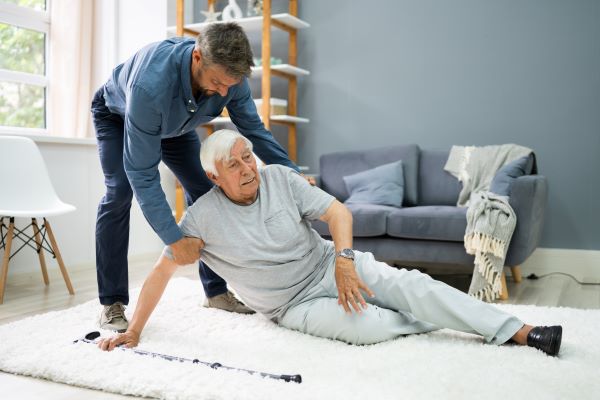As consumers embrace wearable tech, many are unaware of how their personal data is collected, shared, and used, or whether they're protected at all under existing laws such as HIPAA.

Falls Among Seniors are a Major Concern
Our toddler years were marked by falling down, but as we grow into our later years, falling down can be dangerous. This increased risk of injury can create a fear of falling in seniors. The fear of falling causes many seniors to limit the activities they do, which makes them weaker and more prone to falling. Learning how to manage and mitigate the fear of falling can help boost confidence and lead to a lower risk of injury from falls.
What is a Fear of Falling?
The fear of falling is a consuming concern of losing one’s balance, falling down, and suffering an injury. Though the fear of falling can exist because of a fall, many seniors live with this fear even if they haven’t fallen.
According to government statistics, four out of five falls don’t cause serious injury. Even though this is the case, harmless falls can still increase seniors’ fears of falling and cause them to cut back on activities they are still able to do.
Characteristics of a Fear of Falling
People lose their balance for different reasons. Sometimes it is due to an external hazard, such as a slippery floor or missing a step on a stairway. Other times a fall can be self-initiated, such as reaching for something or bending down to pick something up. Whatever the reason for the fall, we tend to start adjusting our posture and the way we walk.
According to a 2020 study, a constant fear of falling causes a person’s central nervous system to make them more cautious. However, with this increased caution comes more hesitancy and an increased risk of falling.
Compared to people of similar age and physical ability, people who have a fear of falling show less control over their sense of balance. Their anxiety may increase if they experience repeated threats to their balance. Aging and neurological diseases affect how people handle threats, whether they are real or perceived. The fear of falling can cause them to shift their body weight the wrong way. This is the leading cause of almost half of all falls among seniors.
Falling Risk Factors
There are many factors that contribute to an increased risk and perceived risk of falling. Some of these risk factors are:
- Vision problems
- Lower body weakness
- Medications that affect balance
- Foot pain or poorly fitted footwear
- Tripping hazards like uneven flooring and steps
- Neurological disorders
- Balance and walking difficulties
Reducing the Fear of Falling
Studies suggest that improving cognitive and physical fitness can help you maintain your confidence when moving around. Talk with your healthcare provider about these options:
- Regular eye exams: Impaired vision can double your risk of falling. Get your vision checked at least once a year, and keep your eyeglasses and contact lens prescriptions updated.
- Exercise: Regular exercise improves your coordination and stability, leading to more self-confidence. Exercise also maintains strength in your core, legs, and buttocks. Some forms of exercise that are especially good for balance are walking, swimming, cycling, yoga, Pilates, and tai chi.
- Supplements: Vitamin D is used to strengthen bones, which can help reduce the likelihood of falling. Talk with your doctor about adding vitamin D to your diet.
- Physical therapy: A physical therapist can help you strengthen your muscles, practice good posture, and improve your walking form. Ask your doctor about working with a physical therapist to help you restore your mobility and confidence.
- Lighting: Along with older age often comes diminished eyesight. Improving the lighting quality in your home can help you move around more safely and confidently.
- Stay steady: Wear sturdy shoes that fit your feet well and have nonslip soles. Walk in familiar places with someone strong enough to support you and help you up if you fall. Avoid walking in the dark or on slippery surfaces.
- Coping: Identify and avoid situations where you have a greater risk of falling. Make a plan for getting help if you do fall. Set small goals for yourself that will increase your self-confidence.
Summary
Though the solution to the fear of falling may seem to be to do as little as possible, the opposite is true. By staying active and exercising the balance-oriented parts of your body, you can build your confidence and decrease your chance of falling. Talk with your doctor about the different ways you can reduce your fear of falling.
Our law firm is dedicated to keeping you informed of issues that affect seniors who may be experiencing declining health. We help you and your loved ones prepare for potential long-term medical expenses and the need to transition to in-home care, assisted living care, or nursing home care. Please contact us at 914-498-8709 with any questions or concerns you have regarding planning for long-term care and estate planning.